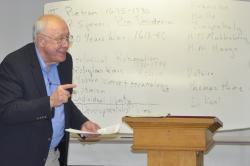
Main menu
- Board Members
- Store
- Course Faculty
- Mission and Partnership
- Online Learning
- Staff
- Synodically Authorized Ministry
- Study Materials (Free)
Darrell Jodock
St. Olaf
"500 Years of Interpreting and Reinterpreting Luther."
The legacy of Martin Luther is a living tradition, always wrestling with how to connect the historical Luther and the faith community today. The basic principles of Luther’s teachings are valuable in many, many situations. But in any given context, some seem more important than others. These are emphasized, while others are neglected. When the situation changes, the emphasis also changes. Over the past 500 years the followers of Luther have found themselves in many different contexts. For example, in the late 1500s and in the 1600s Lutherans struggled to define and defend the distinctiveness of their teachings. They feared that Luther’s insights would be blotted out. The emphasis fell on the ways Lutheranism differed from other Protestants and from Roman Catholics. But, after the Thirty Years War and the demoralization that accompanied it, the emphasis shifted to cultivating individual faith and renewing hope. Protestantism had been successfully defended, even if at great cost. Denominational differences became less central. Each of these two developments produced a school of thought that has continued to play a role in church life. They were followed by others: an emphasis on reason and “progress” in the 1700s, an emphasis on historical development in the early 1800s, an emphasis on the cultural significance of Christianity in the late 1800s, and, in the early twentieth century, an emphasis on the distance between the kingdom of God and any of its embodiments. We will examine these developments and what they meant for the church and then seek to assess where the emphasis should be today. What has been neglected and can be retrieved? What has been over-emphasized and can be modified? What does and does not “speak” to the problems and possibilities of today? What is the vibrant center of contemporary Lutheran thinking?
Questions & Comments
If you have further questions or comments about Select Learning theological materials, please contact:
Maria Rodas
maria@selectlearning.org
NOTE: Please include your church name and address. Thank you.
Newsletter Signup
Sign Up Now
For Email Newsletters you can trust.
Address
Select Learning
1068 Summit Avenue
South St. Paul, MN 55075
P: 877.675.6275
E: info@selectlearning.org
1068 Summit Avenue
South St. Paul, MN 55075
P: 877.675.6275
E: info@selectlearning.org

